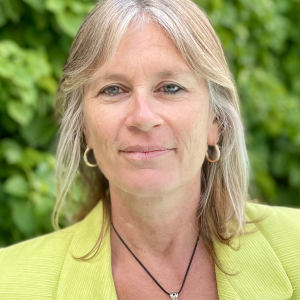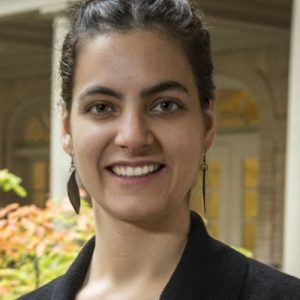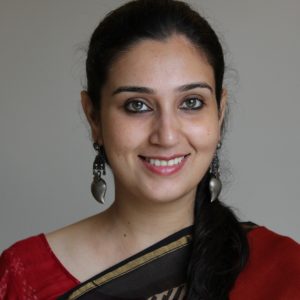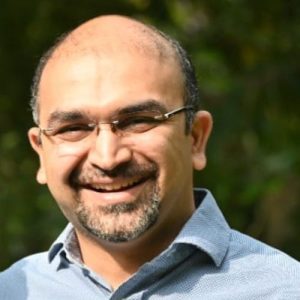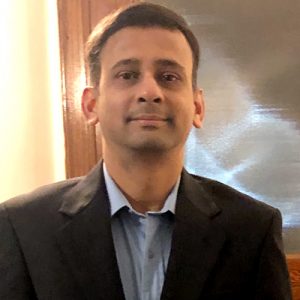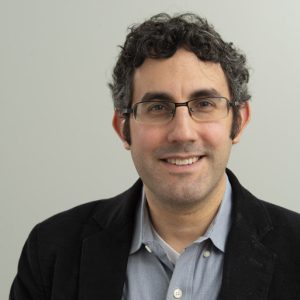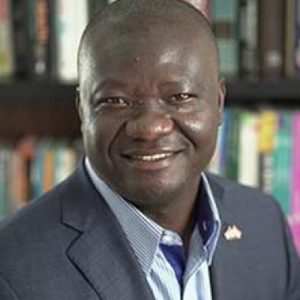Bloomberg School
of Public Health
LISTED ALPHABETICALLY
Smisha Agarwal, PhD
Associate Professor; Director, Center for Global Digital Health Innovation Johns Hopkins Bloomberg School of Public HealthDr. Agarwal's research is aimed at improving maternal and newborn health in low-income settings through strengthening community health systems and leveraging innovative technological solutions. Over the last decade, she has developed methods for evaluating programs that employ digital tools such as mobile phones for health service delivery. She has also led a series of systematic Cochrane reviews that have been leveraged by the WHO to develop global guidelines on the use of digital tools to strengthen health services. She continues to work with bilateral and multilateral agencies to support development and implementation of routine health information systems. Specifically, her research is focused on- 1. The effectiveness of the use of digital devices by community health workers as decision-aids to improve delivery of primary health care services, especially for mothers and infants; 2. Using predictive analytics and machine learning algorithms based on routine monitoring data to enhance our understanding of quality of care, create safety nets to care for high-risk populations and improve effectiveness of reproductive health services; 3. Use of social media websites and data to understand health patterns and behaviors. Currently, she is working in collaboration with the Population Council, and colleagues at Pathfinder International (Uganda) and Zanmi Lasante (Haiti) to conduct a multi-country study using discrete choice experiments to understand incentive preferences of community health workers in Kenya, Bangladesh, Uganda and Haiti.
- Digital Health
- Maternal & Child Health
Abdulgafoor Bachani, PhD, MHS
Associate Professor Johns Hopkins Bloomberg School of Public HealthMy research focuses on health systems, as well as developing and implementing innovative approaches to measuring the burden of and preventing injury and disabilities, as well as enhancing access to rehabilitation services. I hold a particular interest in developing approaches for: 1) the measurement of disability and understanding the long-term health, economic, and societal consequences of injuries; 2) enhancing the generation and use of valid and reliable data for injury prevention, disability, and rehabilitation in low-resource settings; 3) applying novel information and communication technology approaches to injury prevention, disability, and rehabilitation; and, 4) developing sustainable capacity for research and practice in the field of injury prevention, disability, and rehabilitation.
- Digital Health
- Health Systems
- Injury Prevention
Judy Bass, PhD, MPH
Associate Professor Johns Hopkins Bloomberg School of Public HealthOur global mental health program, housed within the department of Mental Health, takes a multi-disciplinary collaborative approach to create actionable solutions to the promotion of mental health, and the prevention and treatment of mental health and psychosocial problems in low-resource contexts around the world.
- Mental Health
Sara Bennett, PhD
Professor & Vice Chair in the International Health Department; GKII Faculty Co-Chair Johns Hopkins Bloomberg School of Public HealthSara Bennett, PhD, is an accomplished and respected figure in the field of health policy and systems research. As a Professor and Vice Chair in the International Health Department of the Johns Hopkins Bloomberg School of Public Health, she also serves as the Director of the Health Systems Program. Her areas of expertise include health workforce issues such as motivation and planning, health financing, and health markets in low- and middle-income countries. Dr. Bennett’s research has had a significant impact on the development of the field, and she has made important contributions to institutional capacity development, health systems governance, and the use of evidence in policy and decision-making. Her career includes both academic and policy positions, including former Chair of Health Systems Global, editor of Health Policy and Planning, and Executive Director of the Alliance for Health Policy and Systems Research at the World Health Organization. Dr. Bennett’s dedication to bridging the gap between academia and practice, as well as building institutional capacity for health research internationally, is evident in her strong commitment to making a real-world impact. She graduated with distinction from Oxford (MA), Cambridge (MPhil) and London School of Economics (PhD). Follow Dr. Bennett on Twitter @saracbennett for updates on her latest research and thoughts on health policy and systems.
- Health Systems
- Policy
- Public Health
- International Health
Uttara Bharath Kumar, MHS
Senior Program Officer II & Team Leader Johns Hopkins Bloomberg School of Public HealthTechnical Advisor for Social and Behavior Change (SBC) Team Leader for Johns Hopkins Center for Communication Programs (CCP) India Uttara Bharath Kumar works on the research, design, implementation and evaluation of global interventions that address social, structural and behavioral barriers to positive health outcomes. Since 1993, she has worked in health areas ranging from RNMCH, HIV/AIDs, TB and malaria to non-communicable diseases, including cancers and mental health. Drawing from behavioral science, design thinking, entertainment-education and other SBC approaches, some of the programs she has led in Africa and Asia, have won prestigious awards. In addition to co-facilitating SBC capacity strengthening workshops and courses in 15 countries, she had led the annual South Asia Regional workshop on Leadership in Strategic Communication (LSC) since 2012. She has also been closely involved in founding and mentoring locally-governed SBC organizations in India and Zambia.
- Infectious Diseases
- HIV
- Tuberculosis
- Mental Health
- Non-Communicable Diseases
- Cancer
- Public Health
Nilanjan Chatterjee, PhD
Bloomberg Distinguished Professor Johns Hopkins Bloomberg School of Public HealthI collaborate with the Center for Cancer Epidemiology at the Tata Memorial Cancer Hospital, Mumbai, in designing and analyzing genetic and epidemiologic studies across cancers of different sites. This collaboration has led to discovery of new genetic risk locus of gall bladder cancer (Mahatre et al., Lancet Oncology, 2017) and characterization of risk of breast and gallbladder cancers with respect to various lifestyle and reproductive factors. I am also in close contact with educators and researchers from a number of statistical and data science institutes in India including the Indian Statistical Institute (my alma mater) and the National Institute of Biomedical Genomics.
- Data Science
- Cancer
Svea Closser, MPH, PhD
Associate Professor Johns Hopkins Bloomberg School of Public HealthI am a medical anthropologist, and I use ethnographic methods to explore the complexities of public health policymaking and implementation. I work primarily with colleagues in North India on issues related to Primary Health Care, including understanding the experiences of ASHAs; promoting community accountability for PHC; and exploring the relationship between vertical programs and the NRHM.
- Primary Healthcare
- Policy
- Community Health
- Vaccines
Joanna Cohen, PhD
Bloomberg Professor of Disease Prevention Johns Hopkins Bloomberg School of Public HealthWe collaborate on tobacco control policy studies in India. We also offer a range of tobacco control capacity building programs, including full scholarships to competitive applicants for our Global Tobacco Control Certificate Program.
- Behavioral Science
- Policy
- Substance Use
Samyra R. Cox, PhD, MPH
Assistant Scientist, International Health Johns Hopkins Bloomberg School of Public HealthI am an infectious disease epidemiologist with fifteen years of global health experience, primarily in tuberculosis (TB) programs and research. My research focuses on using epidemiologic and implementation research methods to answer policy-relevant questions about optimizing interventions for TB. I have been collaborating with Indian researchers on prospective cohort studies and trials focused on TB since 2017, including several studies under the Regional Prospective Observational Research for TB (RePORT) consortium. Currently, I am a co-investigator on the TB Aftermath hybrid effectiveness-implementation trial which assesses the comparative effectiveness of home-based vs. phone screening for TB in the post-treatment period in India. I am also a co-PI for the TB Free Schools Initiative in India, a cohort study that assesses the yield of active case finding for TB among school children. In addition to my projects in India, I am interested in identifying and testing novel strategies to help close the case detection gap for TB in Tajikistan and other Central Asian countries.
- Infectious Diseases
- Tuberculosis
- International Health
Lauren Czaplicki, PhD, MPH
Assistant Scientist Johns Hopkins Bloomberg School of Public HealthI conduct tobacco control research to investigate how corporate actions – and public health interventions developed to address these actions – impact behavior and perceptions at the population level. My research in India uses qualitative methods to explore how to reduce attractiveness of tobacco marketing through tobacco control policy interventions.
- Behavioral Science
- Policy
David Dowdy, MD, PhD
Associate Professor Johns Hopkins Bloomberg School of Public HealthI am involved in a number of projects related to TB control in India.
- Infectious Diseases
- Tuberculosis
Anna Durbin, MD
Professor, International Health and Director of the Center for Immunization Research Johns Hopkins Bloomberg School of Public HealthMy work focuses on the development and evaluation of vaccines for emerging infectious diseases such as dengue and Zika. I have collaborated with vaccine manufacturers in India to manufacture and evaluate a live attenuated tetravalent dengue vaccine in India. The U.S. National Institutes of Health as licensed this technology to several vaccine manufacturers in India with the goal of in-country production and delivery of this vaccine to benefit those at risk in India.
- Infectious Diseases
- Vaccines
Cyrus Engineer, DrPH, MHS, MHA
Professor of the Practice & Associate Chair, Academic Programs Johns Hopkins Bloomberg School of Public HealthDr. Engineer has become deeply engaged in India on a grant led by Dr. David Peters at Johns Hopkins Bloomberg School of Public Health, leading work on how to ‘restructure’ the directorate of medical health in the state of Uttar Pradesh – a large and complex assignment for a directorate responsible for the health of over 200 million people. Their analyses and engagement in the directorate has led to plans for strengthening training and development infrastructure, delivery and content in public health and management for the health workforce in Uttar Pradesh.
- Health Systems
Dani Fallin, PhD
Professor and Chair Johns Hopkins Bloomberg School of Public HealthI chair the Department of Mental Health, the only department of its kind in a School of Public Health in the world. I also lead a center dedicated to public health approaches to autism spectrum disorder.
- Autism
- Mental Health
Jonathan Golub, PhD, MPH
Professor of Medicine, Epidemiology, and International Health Johns Hopkins Bloomberg School of Public HealthJohns Hopkins School of Medicine
Jonathan Golub, PhD, MPH brings more than 20 years of experience focusing on the epidemiology, detection, and prevention of TB in low and middle-income countries and the many drivers associated with TB acquisition, progression, and treatment outcomes. He is a Professor of Medicine, Epidemiology, and International Health at the Johns Hopkins Schools of Medicine and Public Health. He is experienced in developing and implementing research studies for TB in Brazil, South Africa and India, leading and managing large research teams in these countries. Current NIH grants that he is leading include: implementation of a new test and treat strategy for latent TB infection among people with HIV in Brazil (PREVINE); an RCT comparing strategies for detecting recurrent TB among people who have completed TB treatment in India, and extent of pulmonary impairment at the end of TB treatment and beyond (TB Aftermath); an RCT comparing strategies for pulmonary rehabilitation for reducing pulmonary impairment among people with TB in India (TB PuRe); and an RCT comparing smoking cessation interventions among people with HIV in South Africa (Tlogela). Previously, he has led smoking cessation studies and tobacco prevalence studies among people with HIV and people with TB patients in several LMICs and he has also investigated the impact of diabetes on TB outcomes in India. He is currently leading implementation research studies looking at novel ways to increase TB preventive therapy among HIV-infected patients in several African countries through Unitaid’s IMPAACT4TB. He is currently the JHU Research Development Team Lead Investigator, overseeing the SMART4TB Technical Area teams at JHU and with partners for the USAID funded project. He has served on WHO expert panels for operational research and guideline development groups for developing TB screening guidelines. He is actively involved in Fogarty training grants in India and South Africa (currently site-PI with University of Witswatersrand) and was PI for 11 years for a Fogarty HIV/TB training program in Brazil, which was expanded to include trainees from Mozambique, India and Brazil. He is currently Director of the Developmental Core for the JHU Tuberculosis Research Advancement Center (TRAC). Finally, he has taught the Epidemiologic Basis for Tuberculosis Control at the Johns Hopkins Bloomberg School of Public Health for 18 years and has taught the course in South Africa, Brazil and India as well.
- Infectious Diseases
- HIV
- Tuberculosis
- Diabetes
- Public Health
- International Health
Gigi Gronvall, PhD
Associate Professor, EHE; Senior Scholar, Johns Hopkins Center for Health Security Johns Hopkins Bloomberg School of Public HealthWe host and facilitate an ongoing Track II (nongovernmental) dialogue on biosecurity between experts in India and the United States. There are multiple goals for the dialogue: to expand knowledge and understanding between India and the United States about biological threats; increase awareness and probability of exchanges for early warning and detection of unusual biological events; deepen relationships between participants to serve as technical resources to each other going forward; and to identify issues that may warrant official government-to-government priority.
- Policy
- Health Security
Rebecca Heidkamp, PhD
Associate Scientist Johns Hopkins Bloomberg School of Public HealthI lead DataDENT (www.datadent.org), an initiative funded by the Bill & Melinda Gates Foundation to strengthen nutrition measurement for policy planning and decision making. The DataDENT work in India is led by IFPRI and is focused on a) harmonizing measurement across partners involved in the National Nutrition Program (Poshan Abhiyaan) including for COVID-19 impacts and response, b) improving nutrition data decision tools (e.g. dashboards) and c) strengthening measurement of nutrition sensitive social protection programs.
- Nutrition
- Program Evaluation
Anna Kalbarczyk, DrPH, MPH
Assistant Scientist Johns Hopkins Bloomberg School of Public HealthIn collaboration with colleagues at IIHMR, Jaipur, I have conducted implementation research that seeks to map, synthesize, and translate knowledge from polio eradication. Other key projects include evaluation of student training sites in Pune, Banglaore, Hyderabad, and Delhi.
Aastha Kant, PhD
MCHI Assistant Director - Research Programs Johns Hopkins Bloomberg School of Public HealthDr. Aastha Kant is Assistant Director of Research Programs at the Johns Hopkins Maternal and Child Health Center India. She is based in India and is the point of contact for programmatic activities undertaken by the Maternal and Child Health Center India. Dr. Kant holds a Ph.D in Social Sciences from the Tata Institute of Social Sciences (TISS) and received her training in Sociology with her Master of Arts (MA) from University of Pune and Bachelor of Arts (BA) from Lady Shri Ram College for Women, University of Delhi. She has previously worked at Harvard T.H. Chan School of Public Health- India Research Center, TISS and Population Council- India Country Office. She is broadly interested in the social and behavioral aspects of reproductive, maternal, newborn and child health.
- Maternal & Child Health
- Sociology
Joanne Katz, ScD
Professor Johns Hopkins Bloomberg School of Public HealthAnalyses of data from two studies including the Aravind Comprehensive Eye Survey (ACES) and the Vitamin A Study in Newborns (VASIN). Both studies were conducted in collaboration with the Aravind Eye Hospitals in Madurai. Tamil Nadu.
- Maternal & Child Health
- International Health
Caitlin Kennedy, PhD, MPH
Associate Professor Johns Hopkins Bloomberg School of Public HealthI have collaborated on a few HIV-related projects, including PrEP use and community mobilization for sex workers and a matrimonial service for people living with HIV.
- HIV
- International Health
Ryan Kennedy, Phd
Associate Professor Johns Hopkins Bloomberg School of Public HealthDr. Kennedy has worked in tobacco control for 20 years. His research aims to support the development, implementation and evaluation of tobacco control policies globally. In India Kennedy has lead numerous studies to measure tobacco vendor density, assess compliance with smoke-free laws and understand tobacco industry advertising and promotion in retail settings.
- Policy
- Public Health
Maria Knoll, PhD
Senior Scientist Johns Hopkins Bloomberg School of Public HealthEfforts have included estimating the number of pneumococcal pneumonia and meningitis cases and deaths overall and by state since the year 2000. Pneumococcal conjugate vaccine (PCV) was recently introduced into the immunization program of several high burden states and recent efforts have included assessing its impact on vaccine-type pneumococcal carriage, chest x-ray confirmed pneumonia, and severity of disease in hospitalized pneumonia cases and on vaccine-type pneumococcal carriage in healthy children in the community.
- Pneumonia
- Vaccines
Kunihiro Matsushita, MD, PhD
Associate Professor Johns Hopkins Bloomberg School of Public HealthDr. Matsushita is an Associate Professor of Epidemiology and Medicine and a member of the Welch Center. He has expertise in risk factors for cardiovascular disease (CVD), including hypertension. He is co-directing a team at Hopkins supporting activities of the Resolve to Save Lives (RTSL). In this context, he has been collaborating with the RTSL India office, the Indian Council of Medical Research, and the WHO India office.
- Cardiovascular Disease
- Hypertension
Conor McMeniman, PhD
Assistant Professor Johns Hopkins Bloomberg School of Public HealthMosquito-borne diseases such as dengue and malaria are a major threat to public health in India. Our research program uses integrative methodology spanning the fields of invertebrate neurobiology, analytical chemistry and genome-engineering to understand molecular and cellular basis of mosquito attraction to humans. We aspire to apply such knowledge to generate powerful new strategies to control of mosquito-borne diseases in the region.
- Infectious Diseases
Kayur Mehta, MD
Assistant Scientist Johns Hopkins Bloomberg School of Public HealthDr. Mehta is Assistant Scientist at the International Vaccine Access Center. He is a pediatric infectious disease specialist with a focus on infectious disease epidemiology and maternal and child health, particularly in low- and middle-income country settings. He has several years of clinical and research experience in infectious diseases and child health in India, Nepal and Canada. He is a co-investigator on the PREVAIL project, which aims to evaluate the impact of the rollout of the Pneumococcal Conjugate Vaccine (PCV) in India’s Universal Immunization Program. Dr. Mehta is also the Associate Director of Research at the Johns Hopkins Maternal and Child Health Center India, where his current research focuses on understanding the impact of the COVID-19 pandemic on maternal and child health services in India, and also on understanding the impact of maternal nutrition on birth and infant outcomes.
- Infectious Diseases
- Pneumonia
- Maternal & Child Health
- Pediatrics
- Nutrition
- Vaccines
Shruti Mehta, PhD, MPH
Dr. Charles Armstrong Chair in Epidemiology and Professor in the Department of Epidemiology Johns Hopkins Bloomberg School of Public HealthMy work is centered on improving engagement in HIV and hepatitis C preventive and treatment services across India with a particular focus on key populations such as people who inject drugs. We do this through a combination of structural and individual-level interventions evaluated through novel.
- Hepatitis
- HIV
- Substance Use
Diwakar Mohan, MD, DrPH
Assistant Scientist Johns Hopkins Bloomberg School of Public HealthMy expertise is in community based trials and evaluation of programs for evidence-based policy and practice. In recent years, I have played a strong role in supporting the monitoring and evaluation of digital health and community-based service delivery programs. This includes recent work in India on the trial to assess the efficacy of the Kilkari messaging program, which is the world's largest of its kind.
- Digital Health
- Program Evaluation
Caroline Moreau, MD, MPH, PhD
Associate Professor Johns Hopkins Bloomberg School of Public HealthMy work in India working with colleagues at the Indian Institute of Health and Medical Research in Rajasthan through the PMA project, seeks to improve measurement of adolescent sexual and reproductive health and to evaluate the social factors related to levels in trends in ASRH in Rajasthan. I also seek to evaluate the impact of adolescent SRH programming in Rajasthan and identify for whom these interventions work.
- Adolescent Health
- Reproductive Health
William Moss, MD, MPH
Professor Johns Hopkins Bloomberg School of Public HealthOur group has worked with the Indian Council of Medical Research, National Institute of Epidemiology, and National Institute of Virology to conduct measles and rubella serosurveys across India before and after measles and rubella mass vaccination campaigns. We are working with our partners to develop a sustainable integrated serosurveillance system to guide the Universal Immunisation Programme, identify immunity gaps, and assess disease burden.
- Infectious Diseases
- Vaccines
Keeve Nachman, PhD, MHS
Robert S. Lawrence Professor and Associate Director of the Johns Hopkins Center for a Livable Future; Associate Chair of Environmental Health and Engineering; Co-Director of the Risk Sciences and Public Policy Institute Johns Hopkins Bloomberg School of Public HealthWhiting School of Engineering
Dr. Keeve Nachman is the Robert S. Lawrence Professor and Associate Director of the Johns Hopkins Center for a Livable Future. He is also the Associate Chair of Environmental Health and Engineering at the Johns Hopkins Bloomberg School of Public Health, and the Co-Director of the Risk Sciences and Public Policy Institute. Keeve has more than 20 years of experience conducting research and teaching in the field of food systems, environmental health and risk assessment. His research focus is the application of the risk sciences to decision-making in the context of diet, drinking water, soils, dust, biosolids, and other human exposures. He has published on an array of food systems and environmental health topics, including food- and water-borne chemical and microbiological hazards, epidemiologic investigations of agricultural communities, soil exposure factors, and the use of epidemiology and computational toxicological methods in risk assessment.
- Environment & Climate
- Water & Sanitation
Tolbert Nyenswah, BSc, LLB, MPH
Senior Research Associate Johns Hopkins Bloomberg School of Public HealthMy work focus on the support to the COVID-19 response initiative during the peak of the India COVID-19 response. I contributed to public health emergency preparedness, and response and advising on Incident Management System. I supported the development of response tools and packages that helped provide needed technical and capacity building support for emergency operations and response system and IMS.
- COVID-19
- Emergency Preparedness
Bryan Patenaude, MA, ScD
Assistant Professor Johns Hopkins Bloomberg School of Public HealthI have conducted a series of studies on measuring and comparing subnational and national inequalities in healthcare financing, out-of-pocket expenditure, access to care, and provision of healthcare services in India. Most recently, I have been working with the USAID-funded ACCELERATE project in support of India's National Strategic Plan for HIV/AIDS to assess the cost-effectiveness of key-populations HIV/AIDS test and treat programs in India and have recently begun working with the Johns Hopkins Maternal and Child Health Center India (MCHI) in West Bengal to measure and track over time changes in the multi-dimensional inequality in access to maternal and child health services, including immunization. My current work focused on creating new metrics to capture the multi-dimensional and intersectional nature of inequality and incorporate it, routinely, into impact and economic evaluations of healthcare interventions utilizes the fourth round of the National Family Health Survey in India as a case study application of the methodology.https://indiainstitute.jhu.edu/wp-admin/post.php?post=31&action=edit#
- Business of Health
- Economics
- Health Systems
Gurumurthy Ramachandran, PhD
Professor Johns Hopkins Bloomberg School of Public HealthDr. Gurumurthy Ramachandran is a Professor and Deputy Chair in the Department of Environmental Health and Engineering in the Bloomberg School of Public Health at Johns Hopkins University. He is also the Director of the Johns Hopkins Education and Research Center for Occupational Safety and Health funded by the National Institute for Occupational Safety and Health. He has conducted research in various areas relating to human exposure assessment in occupational and non-occupational settings. His research has included the development of robust occupational exposure assessment strategies for a variety of airborne contaminants. He has pioneered the use of novel Bayesian statistical methods that synthesize exposure models, monitoring data, and probabilistic expert judgment. He has been at the forefront of research in occupational hygiene decision-making and developing mathematical methods for exposure modeling and analyzing occupational measurements. He has led or participated in multi-disciplinary teams engaged in numerous community and occupational exposure assessment and epidemiological studies in the US, India, and Canada. He is currently involved in a study of brick kiln workers in South Asia and indoor air quality in Bangladesh. These projects have involved advanced techniques for exposure reconstructions. He is also in close contact with educators and researchers from a number of institutes in India including the Indian Institute of Technology, Bombay (my alma mater). He has served as a member of the Board of Scientific Counselors to the National Institute of Occupational Safety and Health (NIOSH) and advisory committees for the National Academy of Sciences (NAS) and the US Environmental Protection Agency (USEPA). He is also serving on the editorial boards of the Annals of Work Exposures and Health, and the Journal of Occupational and Environmental Hygiene. He has a Bachelor's degree in Electrical Engineering from the Indian Institute of Technology, Bombay, a Master's degree in Environmental Engineering, and a Ph.D. in Environmental Sciences and Engineering from the University of North Carolina.
- Data Science
- Non-Communicable Diseases
- Community Health
- Water & Sanitation
Krishna Rao, PhD, MSc
Associate Professor Johns Hopkins Bloomberg School of Public HealthMy work focuses on primary health care and health systems - I am interested in examining different models of primary health care delivery that can provide comprehensive, affordable and affordable primary health care services to populations. I see health care financing as an important aspect of health systems reform and my work has focused on estimating financial hardship caused by out-of-pocket payments, and lost productivity.
- Business of Health
- Health Systems
- Primary Healthcare
David Sack, MD
Professor Johns Hopkins Bloomberg School of Public HealthOur group helps countries prevent cholera and other infectious diarrheal diseases through the development and the effective use of vaccine and improved water sanitation interventions. Inexpensive oral vaccines for cholera are now available but need to be targeted to be most cost effective. We are in the preclinical phase of promising vaccines for enterotoxigenic E coli and shigellosis and hope to start phase one studies soon.
- Infectious Diseases
- Water & Sanitation
Meike Schleiff, DrPH, MSPH
Assistant Scientist Johns Hopkins Bloomberg School of Public HealthMy work focuses on capacity building in terms of development, implementation, and evaluation of courses and other training and fellowship programs. I also collaborate with partners to assess public health educational opportunities and contribute to the literature on best practices and opportunities for the future development of this field.
- Primary Healthcare
- Community Health
- Training
Anita Shet, MD, PhD
Director of Child Health, International Vaccine Access Center Johns Hopkins Bloomberg School of Public HealthAnita Shet is a pediatrician and a public health specialist and director of the Johns Hopkins Maternal and Child Health India program that focuses on addressing health issues among women, infants and children, and strengthening public health capacity in India. Her interests span maternal and child nutrition, pediatric and adolescent HIV, dengue infections, social determinants of health, childhood immunization and vaccine-preventable diseases. Her practice areas include addressing pandemic-related disruptions of routine childhood vaccination and essential health services, and advocacy efforts to expand vaccine access in India and globally. At present, she also focuses on empowering disadvantaged children and youth to live with good health and dignity.
- Infectious Diseases
- HIV
- Pneumonia
- Maternal & Child Health
- Pediatrics
- Public Health
Anthony So, MD, MPA
Professor of the Practice Johns Hopkins Bloomberg School of Public HealthThe Innovation+Design Enabling Access (IDEA) Initiative has worked to support WHO-SEARO in its efforts to organize the first several World Conferences on Access to Medical Products, co-organized by the Government of India, and presented on issues of pharmaceutical innovation and access, R&D transparency, and novel approaches to bringing antibiotics to market and ensuring their sustainable access. As the Strategic Policy Program for ReAct-Action on Antibiotic Resistance, we also work with intergovernmental and civil society partners on issues of antimicrobial resistance, particularly through the Antibiotic Resistance Coalition comprised of over 25 organizations, from Centre for Science, the Third World Network and the Environment and the People's Health Movement to the South Centre, an intergovernmental think for over 50 member states.
Brian Wahl, PhD, MPH
Assistant Scientist Johns Hopkins Bloomberg School of Public HealthI am an infectious disease epidemiologist with an interest in the changing epidemiology of vaccine-preventable respiratory diseases in children. I lead field studies and employ mathematical modelling to address critical questions related to vaccine program performance, optimization, and equity. I have also led several public health training and capacity development efforts with several partner organizations. I have been based in South Asia for more than a decade where I collaborate with researchers from leading institutions in the region.
- Public Health
- International Health
- Vaccines
Kevin Welding, PhD
Associate Scientist; Associate Director, Institute for Global Tobacco Control Johns Hopkins Bloomberg School of Public HealthI am an economist that conducts tobacco control research to inform fiscal and health policy change. Recent work in India has included evidence of illegal smokeless tobacco, health warning label compliance, the market for different tobacco products, and the supply chain for illegal e-cigarettes.
- Basic Science
- Economics
- Policy
- Substance Use
Peter Winch, MD MPH
Professor Johns Hopkins Bloomberg School of Public HealthWater and sanitation, environmental sustainability, qualitative research, formative research.
- International Health



